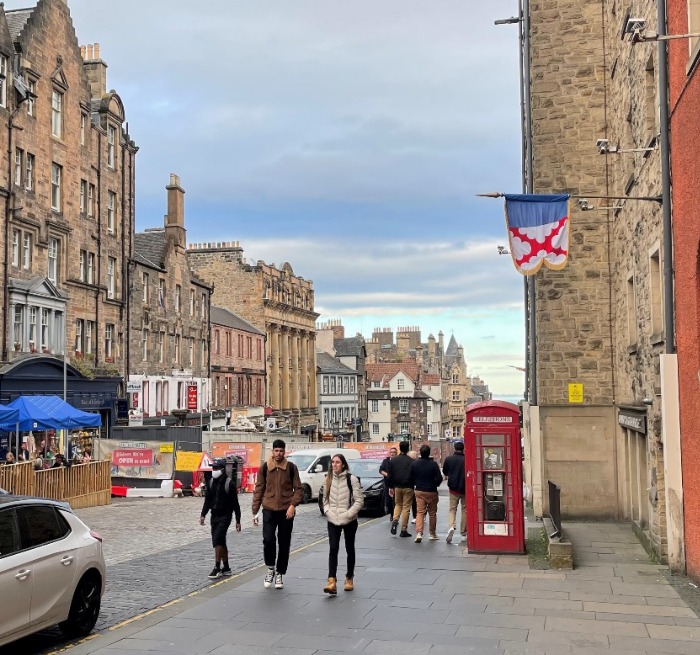What’s it like to study at elite business school, HEC Paris?
Bernice Lee is an MBA student at HEC Paris, ranked fourth in the world in the QS Global MBA Rankings 2022.
The elite business school has graduated more CEOs of Fortune Global 500 companies than any other university in Europe, and has harboured an energising and collaborative global community that mirrors the diversity of today’s economy.
For Bernice, studying at one of the world’s top business schools was an important factor in her decision-making. In fact, she’d decided she wanted to run for President of the HEC MBA Retail & Luxury Club two years before starting the programme.
“I knew I wanted to go to a top-10 business school for my MBA,” said Bernice. “A big part of my decision was based on choosing a school where I could expand my professional network as much as possible.
“When you invest in an MBA, you want to know that your chances for career development and exposure are high. HEC Paris has an impressive alumni network of successful business leaders and partner companies from around the world, which clearly demonstrated that I’d be studying with the best.”
Having worked in the luxury industry for seven years, Bernice was keen to advance her career in the birthplace of couture where she’d have access to internship opportunities specific to her field, and contacts within the most luxurious companies in Paris.
What does a typical week look like for you?
“There is no such thing as a typical week on an MBA degree. Some days, you’re completely packed with classes from nine until five and we only have the chance to sit together for a brief hour during lunch. Other days, you have more time to socialise and develop your professional network.”
Though it’s not just classes. Bernice could have business meetings, guest talks and careers events between her lectures too.
“A typical week on the HEC MBA is not knowing whether it’s Tuesday or Sunday,” she added. “The school organises a lot of events during the weekends, and we plan our own trips for those who want to travel while we’re in France.”
Extracurricular clubs also take up a significant amount of time for MBA students. Unlike the laidback social clubs for undergraduate students, MBA clubs are an opportunity for students to put their business skills to practise.
Being involved in an MBA club could involve organising events and trips, partnering with local companies, marketing club activities and educating and inspiring people through a variety of experiences.
“I was highly ambitious during my role as President of the MBA Retail & Luxury Club, during the uncertain pandemic times. The club was my priority and organising meaningful events was a full-time job on its own.
“I am extremely proud of the largest club mandate to date, with over 28 events executed in a four-month period, including an in-person October Trek Week with over 40 distinguished speakers.”
In what ways do you feel like you’re studying at one of the world’s top MBA programmes?
“Networking is a lot easier when you mention you study at HEC Paris as people automatically recognise the school’s reputation and respond with real positivity,” Bernice said.
“I belong to a school where every single company I can think of comes to HEC Paris to work with MBA students and recruit. I don’t know a company that would say no to the opportunity to network with potential future candidates from HEC.”
Through the school, Bernice has also taken part in speed networking events with big luxury brands in France like LVMH, Chanel and Richemont. “When you think of the number of applicants per position at each of these businesses, it’s wonderful to be one of the few who get to sit down personally with the company for an interview ahead of others,” she said.
The diversity of staff leading the MBA is another key factor of the prestige of HEC Paris. To Bernice, the fact that lecturers and guest speakers come from across the world, not just France, shows how global the community is.
“We hear from business leaders around the world. There is a lot of effort put into delivering the best expertise globally for maximal return on investment for students.”
What are your relationships like with your academics?
“The cohorts are quite small. In my cohort, there are 156 students representing 40 nationalities, so you really have the opportunity to get to know each other and your teachers. Class sizes vary from 30-60 people and professors know you by first name.
“All of the lecturers are very accessible if you need support or guidance, and they will often reach out to you to check in. I find that they are frequently available before and after class. Their personal touch shows a real passion and care for the students,” Bernice said.
Outside of the classroom, professors keep students in the loop with resources that could further benefit the students’ learning.
“One of my professors recently reached out to us mentioning that she had a few tickets to an exclusive event and would like to extend the offer to her students. It goes beyond the content of the classes they teach,” she said.
How is HEC Paris challenging you to become a better business leader?
According to Bernice, the minimum years’ work experience that HEC Paris requires means that students enter the programme with their own precursors of what leadership is and what it should be.
“In class, you might look at a particular leadership theory and everyone brings their own opinions and views on it. Your ideas are instantly challenged and shaped by the people around you.
“Working with people who have different years of experience from a variety of industries truly validates the academic part of the course. I can read a leadership book by myself, but it would never give me as much insight as other people’s perspectives and experiences.”
For Bernice, the most important leader is a humble one: “In the classic way that our society functions, there tends to be a very top-down hierarchical structure. What I’ve learned from my MBA is that you’re not going to achieve a common goal in the most efficient manner if you continue to think hierarchically.
“Being a leader is difficult because society often outlines authority, with a goal of taking direction. However, the other people on your team will often have better ideas than you. Choosing to be humble is the best way to lead a team to success.”
What would you say to those considering an MBA at HEC Paris?
“I was hesitant myself as it’s a huge investment, but I spoke to many HEC MBA alumni who told me it was worth it,” Bernice said.
“If you want to do an MBA, it’s worth applying to top business schools because the name and reputation greatly help to accelerate your career. As a business student, the goal is attaining as much return on your investment as possible.”
Bernice plans to stay in Paris after graduating from her MBA, to advance her career in the luxury industry. She is currently undertaking a contract role at Chloé, off the back of networking in her role as President of the HEC MBA Retail & Luxury Club. She plans to continue working for a luxury house in product merchandising and development.






